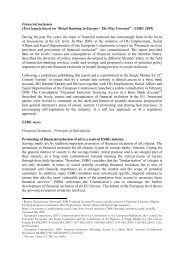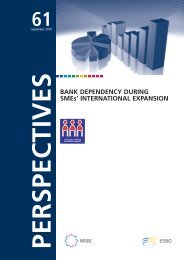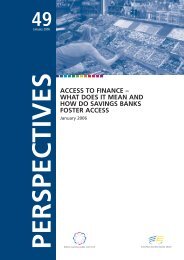Corporate Governance and Access to Finance - ESBG
Corporate Governance and Access to Finance - ESBG
Corporate Governance and Access to Finance - ESBG
Create successful ePaper yourself
Turn your PDF publications into a flip-book with our unique Google optimized e-Paper software.
Even among the relatively narrow universe of listed companies, the diversityin terms of ownership structure, internal organization, board compositions<strong>and</strong> shareholder protection has driven <strong>to</strong> different recommendations of<strong>Corporate</strong> <strong>Governance</strong> practices; <strong>and</strong> their compliance levels differ <strong>to</strong>o allover the world. Under this shareholder model the results are inconclusivein terms of dominance of one system over others. Although the codes ofbest practices <strong>and</strong> recommendations were initiated under the marke<strong>to</strong>riented UK system, many changes <strong>and</strong> adaptations have beenintroduced in different countries <strong>and</strong> regimes. Mullineux <strong>and</strong> Terberger(2006) reject the idea that the UK system should be seen as a modelfor banks in Germany.More recently, the interest for an alternative approach <strong>to</strong> <strong>Corporate</strong><strong>Governance</strong> proposes <strong>to</strong> take in<strong>to</strong> account the welfare of all stakeholdersinvolved in the firm wealth creation, allowing them <strong>to</strong> participate in thedecision process. This trend moves the overall <strong>Corporate</strong> <strong>Governance</strong>approach closer <strong>to</strong> the (traditionally wider) focus of financial institutions,especially those with a “double objective”, like WSBI members.Tirole (2001) models the interests of the non-investing parties includingthe goal of “social interest”, what in practice matches many of theaspects of the <strong>Corporate</strong> Social Responsibility that most companiesnowadays declare <strong>to</strong> adopt.<strong>Corporate</strong> governance of banks <strong>and</strong> savings banksAs mentioned above, the <strong>Corporate</strong> <strong>Governance</strong> of banks needs <strong>to</strong>consider the interest of other stakeholders, the most relevant of whichare deposi<strong>to</strong>rs; hence the need for a relatively tight banking regulation<strong>and</strong> supervision, as well as bank guarantees (deposi<strong>to</strong>r protectionschemes) <strong>and</strong> other protection mechanisms, including the central bankfunction as a Lender of Last Resort <strong>to</strong> insure against liquidity runs.Banking supervisors <strong>and</strong> regula<strong>to</strong>rs are well aware of the specificitiesof the banking sec<strong>to</strong>r from the <strong>Corporate</strong> <strong>Governance</strong> point of view.The Basel Committee on Banking Supervision (BCBS), in the 2010document “Principles for enhancing <strong>Corporate</strong> <strong>Governance</strong>” 30 stressesthe relevance of the <strong>Corporate</strong> <strong>Governance</strong> practices for supervisorybodies <strong>and</strong> banking regula<strong>to</strong>ry rules.30 www.bis.org/publ/bcbs176.htm.97
















